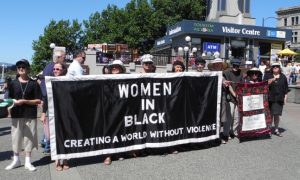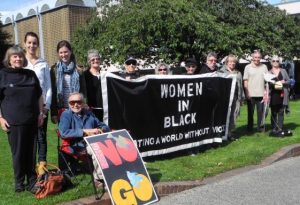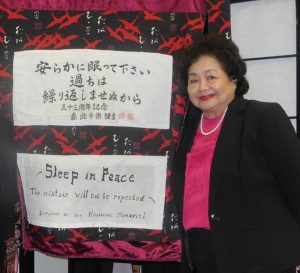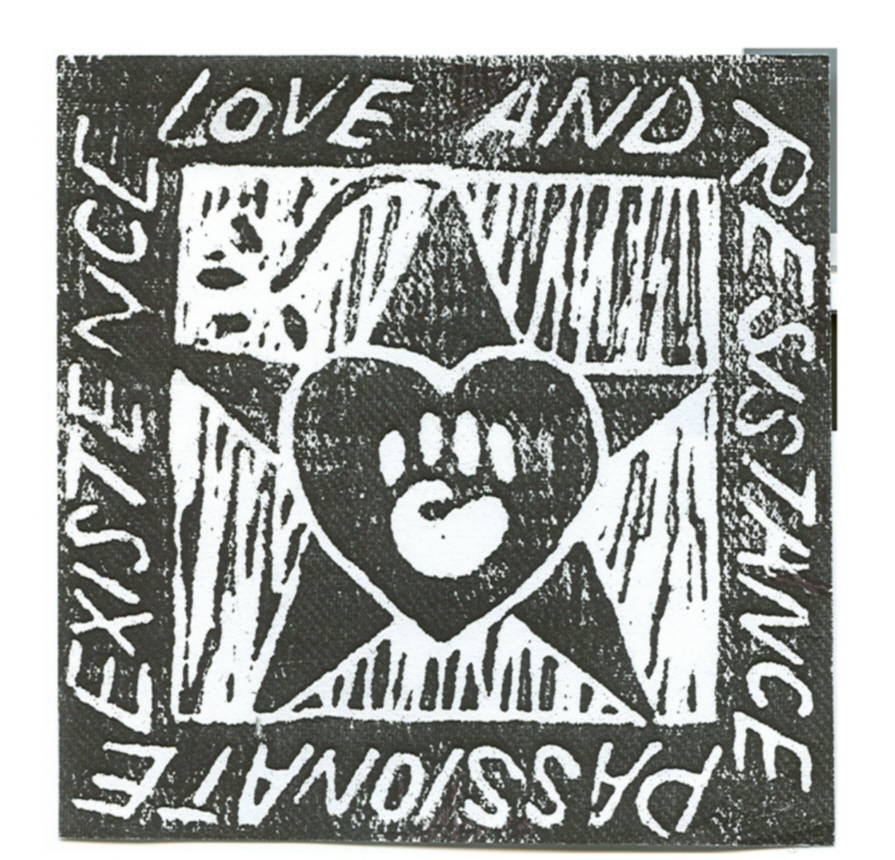VICTORIA WOMEN IN BLACK HISTORY and ACTION
 A group of activists in Victoria is part of a worldwide movement for peace and non-violence.
A group of activists in Victoria is part of a worldwide movement for peace and non-violence.
We hold monthly vigils in downtown Victoria over noon hour – usually on a Thursday and beside City hall. All those who share our hopes and goals are welcome to join us.
While those on the vigil line remain silent; one person passes out the monthly leaflet. She answers questions but we never engage in argument or confrontation. We remain silent in the face of hostility.
VICTORIA WOMEN IN BLACK: a brief history, The group started in October 1995 after Theresa Wolfwood returned from the Beijing Women’s Forum where she attended the WIB demonstration there. Victoria WIB has met since then in silent vigil, usually beside City Hall on the edge of Centennial Sq. on one Thursday a month, at noon. We hold a large banner made by several members of the group.
In August we hold our Hiroshima-Nagasaki remembrance vigil on the sidewalk beside the Tourist office –across from the Empress Hotel.
Over the year a pattern has emerged in our vigils. We hand out a different leaflet every vigil. Many are for special occasions- March, International Women’s Day where we have noted violence against women (including Canadian 1st Nations women) & other issues on women’s rights that remain unresolved; May, Mother’s day for Peace  –the original meaning of day as a day of action for women to end war, not a day for flowers & cards; Hiroshima-Nagasaki, noting Canada’s participation in providing uranium for bombs. We pass out white poppies & a bookmark with information on the significance of the poppy in November. In December we sometimes celebrate Human Rights Day &/or ethical gift ¬giving for Xmas. Our leaflets always include action suggestions with names & addresses.
–the original meaning of day as a day of action for women to end war, not a day for flowers & cards; Hiroshima-Nagasaki, noting Canada’s participation in providing uranium for bombs. We pass out white poppies & a bookmark with information on the significance of the poppy in November. In December we sometimes celebrate Human Rights Day &/or ethical gift ¬giving for Xmas. Our leaflets always include action suggestions with names & addresses.
Photo 2013 August vigil
Over the years issues presented in leaflet have covered – Colombian human rights abuses & Canada’s connection to that country; opposing wars in Iraq, Palestine, Afghanistan & Yugoslavia; also opposing Canadian participation in those wars & military action in Libya & the possibility in Syria. We write about economic violence – the poverty of marginalized people in Canada – homeless, disabled, 1st Nations – and draw attention to growing economic inequality in Canada. We document the rise in our military budget as social services are cut. We have written about creating a culture of peace & the need for more support for education.
rights abuses & Canada’s connection to that country; opposing wars in Iraq, Palestine, Afghanistan & Yugoslavia; also opposing Canadian participation in those wars & military action in Libya & the possibility in Syria. We write about economic violence – the poverty of marginalized people in Canada – homeless, disabled, 1st Nations – and draw attention to growing economic inequality in Canada. We document the rise in our military budget as social services are cut. We have written about creating a culture of peace & the need for more support for education.
Photo: Lilliany Obando with peace poppies in a Victoria garden – political prisoner, now under house arrest for her human rights work. She has been the subject of a WIB leaflet.
in October we alerted people to the $1B. Which our government wants to spend on drones & how we would spend that amount. We make suggestions for where to buy fair trade products, how to become involved in social movements locally, supporting grassroots initiatives like Occupy & Idle No More & other peace & justice groups.. We maintain contact locally with a list serve & also have contact with Calgary WIB.
Victoria WIB also participates in other events- like the annual Earth Walk & recently the demo against Canadian participation in military action in Syria. We make decisions after the monthly vigil & by Email.
We welcome people who spontaneously join us when they see us & also many visitors from around the world have joined us from a UK MP to a Guatemalan women’s activist.
History of WOMEN IN BLACK globally
Women in Black is a women’s anti-war movement with an estimated 10,000 activists around the world. The first group was formed by Israeli Jewish & Arab women in Jerusalem in 1988, following the outbreak of the First intifada.
Responding to what they considered serious violations of human rights by Israeli soldiers in the Occupied Territories, the women held a vigil every Friday in central Jerusalem, wearing black clothing in mourning for all victims of the conflict. Many local WIB groups made contact with women across the Green Line engaged in support work, e.g. visiting Palestinians in Israeli prisons.
The initiative soon spread to various other locations in Israel, with women standing weekly in main squares of cities or at junctions on inter-city highways. As was decided early on, the movement did not adopt any formal program other than opposition to the occupation. Local groups were autonomous in deciding such issues as whether or not to open participation to men as well as women, and there were many shades of political difference from one place to another.
The first vigils in other countries were started in solidarity with the Israeli group, but then embraced other social and political issues. Especially notable were the Women in Black group in former Yugoslavia, which in the 1990s confronted rampant nationalism, hatred and bloodshed, often meeting with violence from nationalists.
While each group is free to pursue its own goals and activities, the women maintain regular contact via e-mail and the Internet, and hold annual international conferences. Their most common tactic consists of standing together periodically in various public places, usually in complete silence.
Women in Black was inspired by earlier movements of women who demonstrated on the streets, making a public space for women to be heard – particularly Black Sash, in South Africa, and the Madres de la Plaza de Mayo, seeking the “disappeared” in the political repression in Argentina. But WIB also shares a genealogy with groups of women explicitly refusing violence, militarism and war, such as the Women’s International League for Peace and Freedom formed in 1918, and the Greenham Common Women’s Peace Camp in the UK and related group around the world opposing the deployment of US missiles in the eighties.
In other countries, including other places in Canada, the USA, Australia, and many European countries, Women in Black groups started. Italian women founded their own WIB, Donne in Nero, which soon had weekly vigils in Roma, Milano, Bologna, Torino, Ravenna, Padova and Verona. Large numbers of women from Italy have maintained a programme of visits to Israel/Palestine for more than a decade.
Soon after, when Yugoslavia began to disintegrate and war broke out between the former Yugoslav republics, some of the Italian women visited feminist activists in Belgrade, which led to a similar form of organization and action there. Women in Black in Belgrade (Zene u Crnom) was formed in 1991. Explicitly feminist, they have been actively opposing nationalist aggression and masculine violence ever since. Zene u Crnom had a strong and challenging street presence, with regular weekly vigils in Republic Square in Belgrade from 1991. They work in partnership with men refusing to serve in the military, and have maintained an extensive programme involving public statements, writing and publishing, educational workshops and seminars, and organizing international visits and meetings.
A Spanish WIB network, Mujeres de Negro, were by now strong and active. They helped find refuge, respite and a public platform in Spain for women from the Yugoslav region. It was with an important input from Mujeres de Negro and Donne in Nero that the women of Zene u Crnom in Belgrade organized a series of ten annual international encounters at different locations in the former Yugoslavia, which have been an important force creating and expanding the international network.
They helped find refuge, respite and a public platform in Spain for women from the Yugoslav region. It was with an important input from Mujeres de Negro and Donne in Nero that the women of Zene u Crnom in Belgrade organized a series of ten annual international encounters at different locations in the former Yugoslavia, which have been an important force creating and expanding the international network.
During the sequence of wars that began in 1992, in Croatia and Bosnia., Women in Black groups sprang up in many more countries, supporting Zene u Crnom Belgrade in their opposition to nationalist aggression. Women got together in Belgium (a French-speaking group Femmes en Noir in Brussels and Flemish-speaking group Vrouwen in het Zwart in Leuven). Women in Black London took its name at this time, starting to hold weekly or monthly vigils in Trafalgar Square, in central London.
Women in Black in India began in 1992. When the Babri Masjid, an ancient mosque, was torn down by Hindu fundamentalists and violence engulfed India, women were the main victims. WIB in the city of Bangalore have stood every Thursday in silent vigils on the streets, in the market squares and in the Gandhi Peace Park, protesting the wars against women.
Women in Black in the Philippines began in 1995. The Asian Women’s Human Rights Council and the Lila Pilipina, an organization of former comfort women, gather often in front of the Japanese Embassy in Manila, dressed in black, demanding compensation for the wartime crime of sexual slavery by the Japanese army in World War II. A landmark occasion in the nineties was a massive Women in Black vigil (an estimated 3000 women) in Beijing on September 4 1995 that was organized by the Women in Black of India and the Asian Women’s Human Rights Council, at the time of the UN World Conference on Women. They called for “a world  safer for women” and an end to wars and armed conflicts.
safer for women” and an end to wars and armed conflicts.
From 1996, Women in Black in Nepal have stood in silent vigils around the issues of trafficking and violence against women in public places in Katmandu. Women in Black meets in Kashmir, calling for a peaceful settlement of conflict there – which is just beginning to happen
In 1998 and 1999 Women in Black groups everywhere had occasion to demonstrate against a sequence of military engagements by the USA, sometimes partnered by the UK, or in the context of NATO. These included continued sanctions and bombing raids against Iraq, the bombing of Sudan and Afghanistan, and the bombardment of Belgrade and other Serbian cities.
Groups of women, primarily from Donne in Nero but also from London WIB and elsewhere have been visiting Palestine and Israel since the start of the al-Aqsa intifada to support Palestinians and strengthen links between them and Israeli women peace activists.
The Asian Women’s Human Rights Council and El Taller International, two networks of women’s human rights organizations in the global south, have held seventeen Courts of Women in different regions and vigils of Women in Black have been held before each Court. There was a very intense and creative demonstration of over 5000 women in Cape Town, South Africa, on the eve of the World Court of Women Against War, For Peace (March 2001). The Women in Black in South Africa stood against war and for peace. Women in Black is present at World Social Forums; in Mumbai Indian WIB organized a panel on war & conflict resolution.
Women in Black in Victoria were thrilled to see that a genuine winner of the Nobel Peace Prize, as Nobel stated it was to awarded to those who worked for peace between nation, was chosen in 2017. The International Campaign to Abolish Nuclear weapons was awarded the prize and Setsuko Thurlow, a friend of our women in black members was chosen to accept the award. Setsuko, a Hiroshima survivor has worked for decades for peace and nuclear disarmament has lived in Toronto for 60 years. . Photo: Setsuko with banner made by TW with her gift, a copy of the inscription on the Hiroshima Memorial

Women in Black locally and internationally have received a number of awards in recognition of their work for peace. The worldwide network was awarded the Millennium Women’s Peace Prize sponsored by the NGO International Alert and the UN agency UNIFEM, and the following year the network was a nominee for the Nobel Peace Prize.
Donne in Nero were awarded the Gold Dove of Peace, an Italian prize, in 2002. The Network was honoured by Church Women United, USA .
Some samples of our leaflet:
Victoria Women in Black Vigil International Women’s Day: March, 2018
Part of a global movement for peace, justice & non-violence
Equality and Universality of Rights and benefits are the basis of a peaceful democratic society.
Today we celebrate Canadian Women who have contributed to these values. Activists: The Famous Five of the Persons Case- Emily Murphy, Irene Marryat Parlby,Louise McKimmey Nellie Mooney McClung Henrietta Muir Edwards, Kay Macpherson,; Rosalie Bertell; Mary Two-Axe Earley Setsuko Thurlow; Alexandra Morton: writers and artists Emily Carr, Dorothy Livesay; Pat Lowther; Heather Spears; Carole Chambers, Jeanette Walker and many more. Their work makes Canada a more fair and just society.
We remember the women who have suffered because they were women; the murdered and disappeared indigenous women; the 14 Montreal students killed in Montreal massacre at École Polytechnique on December 6, 1989; women killed by their partners and families; around the world women killed because they are women who want to control their own lives. We stand with women speaking out about sexual abuse, saying “me too
We remember Berta Isabel Cáceres Flores, Honduras; Phoolan Devi in India; Sophie Scholl in Germany; Virginia Woolf, England; Wangari Mathai, Kenya; Marie Cooper, Canada and more.
Today in many countries women are leaders in the struggle for rights and freedom: we honour Irene Fernandez in Malaysia; Razan Zuayter in Jordan; Ahed Tamami and her mother, Nariman al-Tamimi, Palestinians in prison in Israel; Wanjiku Kironyo in Kenya; Aminatu Haidar, Western Sahara; Angelica Choc, Guatemala; and many more.
In every war and upheaval, rape is a weapon; women continue to be raped wherever there is conflict and oppression. Act for peace by supporting the rights of women!
Other events in Victoria for International Women’s Day
Centennial Sq. today March 8: International Women’s Day Festival: Bread and Roses: 3:30pm – 7:00pm
Panel on Feminism: today March 8. 7 pm to 8:30 pm Greater Victoria Public Library:735 Broughton Street. IWD Art show: ‘Strong Women, Strong World’ at the Bay Centre, lower fl. Show on until March 11
Next WiB vigil April 19 noon to 1 pm beside City Hall Women in Black: Contact: bbcf@bbcf.ca
>>>>>>>>>>>>>>>>>>>>>>>>>>>>>>>>>>>>>>>>>>>>>>>>>>>>>>>>>>>>>>>>>>>>>>>>
Remembering Hiroshima- Nagasaki, August, 1945- 2017
VICTORIA WOMEN IN BLACK part of a world-wide movement for peace & non-violence On August 6, 1945 the USA dropped the atom bomb on Hiroshima; on August 9, another bomb was dropped on Nagasaki. British pilot Leonard Cheshire, on board the plane with that bomb, described the bombing as, “Obscene in its greedy clawing at the earth, swelling as if with its regurgitation of all the life that it had consumed.”
200,000 people died immediately & within days of these bombings; 72 years later people continue to die from the radiation effects of these toxic bombs. Today we remember those who died and suffered in Hiroshima and Nagasaki. We remember Dene1st Nations who mined the uranium in the NWT, Canada for these weapons- not knowing its power & its lasting effects on their health.
We are also hopeful that this year marks the beginning of awareness and action globally of the terrible destructive power of nuclear weapons. In July at the UN more than 120 nations met and agreed on the Treaty on the Prohibition of Nuclear Weapons, or the Nuclear Weapon Ban Treaty, the first legally binding international agreement to comprehensively prohibit nuclear weapons, leading towards their total elimination. In September the UN General Assembly will meet to ratify this treaty. See: https://www.un.org/disarmament/wmd/nuclear/npt/
USA, Russia, China, Britain, Israel, France, India, Pakistan have more than 17,000 nuclear bombs, many made with Canadian technology & materials. They are moving around the globe everyday on land, in the seas & the air – including waters near Victoria. Canada is one of the top 3 producers & exporters of uranium in the world Canada continues to be complicit in nuclear development by selling uranium and nuclear technology. Canada provides so called & highly radioactive ‘depleted uranium’, to 22 nations for weapons – bomb casings, guns, tanks and other steel-hardening military uses. Depleted Uranium weapons were tested in Panama & used in Iraq, Afghanistan and former Yugoslavia. The Canada Pension Plan, mandatory for all working Canadians, invests our contributions in the 5 largest arms makers in the world
which make nuclear as well as non-nuclear weapons that are sold to and used in many countries against civilian populations.
Nuclear weapons and radioactivity continue to threaten the health of all life systems and undermine the security of human society. Wealth and resources wasted on war-making are needed to create a peaceful and sustainable life for all humanity. The time has come when all can call for nuclear disarmament and support this treaty and to call for cuts in our military spending and an increase in social, health and education budgets. Our precious resources and energy should be directed to the creation of a peaceful, just and healthy world. Nuclear nations & a handful of men can destroy all life on earth & that unspoken threat is behind wars waged by nuclear powers today. Setsuko Thurlow, Canadian Hiroshima survivor, says: This is the beginning of the end of nuclear weapons, until now nuclear-weapon states have kept the world hostage in fear and anxiety while squandering trillions of dollars away from meeting human needs …an intolerable and unacceptable reality.
Women in Black calls on the Canadian government to ratify this treaty. Contact: P.M. Justin Trudeau, House of Commons, Ottawa, K1A 0A6
Visitors to Canada from other countries are encouraged to call on their governments to ratify the historic treaty & to work for peace. For more information contact: bbcf(at)bbcf.ca
>>>>>>>>>>>>>>>>>>>>>>>>>>>>>>>>>>>>>>>>>>>>>>>>>>>>>>>>>>>>>>>>>>>>>>>>>>>>
WOMEN in BLACK Silent Vigil: May 5, 2016 FOR A WORLD WITHOUT WAR and VIOLENCE
Women in Black (WiB) is a worldwide movement, started 30 years ago by women in Israel and Palestine, joining together to witness for a peaceful end to the violence in their homeland. In Victoria we are in our 20th year of WiB; there are other groups in many countries.
Mothers’ Day is May 8, founded by a mother, Julia Ward Howe, who called on all mothers to work for peace. We revive the original meaning & ask all mothers & all those who honour mothers to work for peace. She said: We women of one country will be too tender of those of another country to allow our children to be trained to injure theirs. From the devastated earth… a voice goes up with our own. It says, ‘Disarm, Disarm!’ The sword of murder is not the balance of justice! Blood does not wipe out dishonour nor does violence indicate possession…let women now leave all that may be left of home for a great and earnest day of counsel.
Mothers; Day is a day for action – not a day of passive consumerism.
We call on politicians to end our spiralling military build-up & to stop supporting military industries with our tax money. End Canada Pension Plan investment in armaments. Build a Culture of Peace, not war. We, mothers and children of mothers, want a peaceful, just and non-violent world. Today we witness for mothers, our sisters and their families in war zones everywhere. We call for an end to the occupation of Palestine & Western Sahara, with UN negotiated international settlements: we call on colonial powers and their supporters to respect the many resolutions of the UN, the Geneva Conventions on War & to work for an end to all wars: we call on Canada to respect the right of all people to peace with justice.
Contact your local MP or Prime Minister Trudeau at: House of Commons, Ottawa, ON, K1A 0A6. No stamp required.
Next vigil: noon, June 16 by City Hall, Douglas St.. Info: bbcf@bbcf.ca >>>>>>>>>>>>>>>>>>>>>>>>>>


